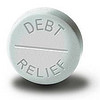If you need help with your credit card debt, you are not alone.
Many people, just like you, face a financial crisis from time to time. It could be caused by personal or family illness, loss of job, cut in pay or just overspending.
As bad as it may seem, it can be overcome.
The first step you must take is to get a realistic financial picture of where you are. It does not have to be complicated or too exhaustive at this point, but you have to know where you stand.
You may want to use a simple Household Budget that will help you determine your total income and outgo.
In a time of financial crisis, you need to ask yourself some tough questions:
- Do you really need all the "bells and whistles" of your cable TV?
- Can you cut back on your heating/cooling/water and other utility bills?
- What about miscellaneous spending? Do you really need to be spending $5/day for that latte? I know, but...
- How about putting a hold on that gym membership you rarely use?
Starting to get the idea?
If you find out that there is just not enough money at the end of the month to pay all of the bills, you must make some tough decisions.
There is a HUGE difference between SECURED and UNSECURED debt.
Secured debt includes things like your mortgage, auto loan and possibly furniture or appliances if you financed through a finance company.
Failure to pay these debts could result in foreclosure or repossession. So, make sure these are your primary bills that have to be paid each month.
Your unsecured debts including credit cards, personal loans, any debt that is not secured by collateral, can be treated differently in time of crisis.
This is not the time to be overly concerned with your credit score!
We're talking about survival here. The credit score issue can be dealt with later!
If you can service the secured debts, but there is not enough for the unsecured debts, contact each of those creditors and ask for a lower payment and/or interest rate.
Some creditors will work with you, but don't be surprised to discover that they really don't care about you or your situation!
If that is the case, you may want to contact a professional Debt Management Company to help.
You may qualify for a Debt Management Program or a Debt Settlement Program. A qualified company will go over you situation and budget very thoroughly before making a recommendation.
Be aware that most companies only offer one solution. No one program will fit every situation, so be very careful.
In a Debt Management Program, each of your unsecured creditors will be contacted and a lower payment/interest rate will be arranged. You will have ONE MONTHLY PAYMENT and it will be disbursed to each of the creditors accordingly.
These programs will usually take 48 months or so, but each of your debts will be repaid and you will not be receiving calls from collectors.
If you do not qualify for the DMP, then the Debt Settlement Program may be your best option.
In the DSP, negotiations will be made with each of your creditors for a reduced amount. As you cannot afford to keep paying the monthly amount, these accounts will ultimately charge off and go to a collection agency.
You will receive phone calls which can be very annoying, but there is a way to stop these calls. Click here for a FREE REPORT.
These amounts will vary, but should be around 50% of the balance at the time of settlement.
Of course, you will need to set aside an amount your budget can handle to have funds to negotiate, so make sure you can be disciplined to make those deposits each month.
If after going over you budget and examining your options, you may be forced with the ultimate decision of seeking bankruptcy protection.
You should consult a bankruptcy attorney to find out which plan would be best for you.
Regardless of which option you choose, taking control of your situation will help put an end to the worry and frustration that financial pressure brings.
Most people find that after going through all of the steps above and choosing the appropriate solutions, it was not as bad as it seemed.





 HELP! They took money out of my paycheck and I can't pay my rent!
HELP! They took money out of my paycheck and I can't pay my rent!









